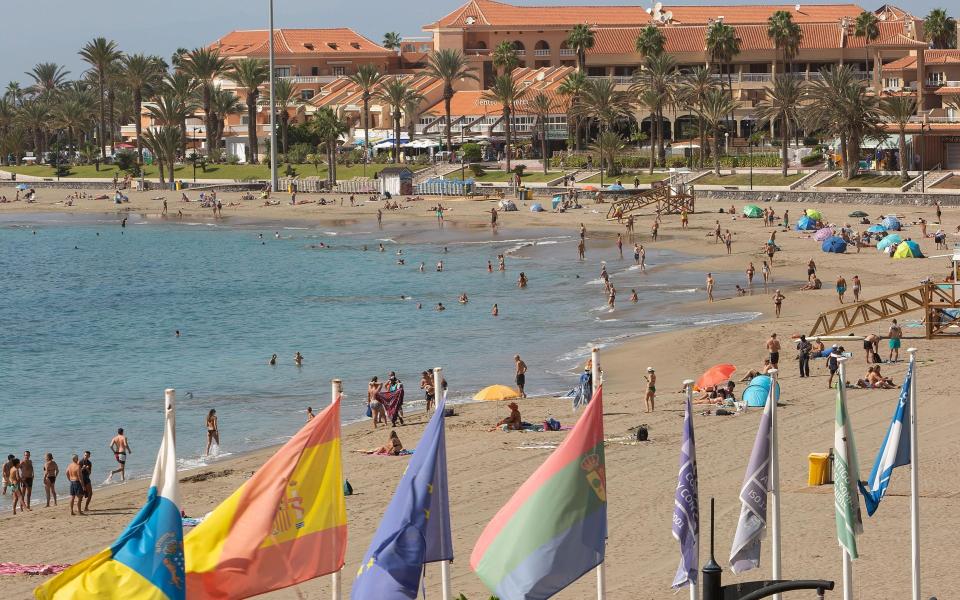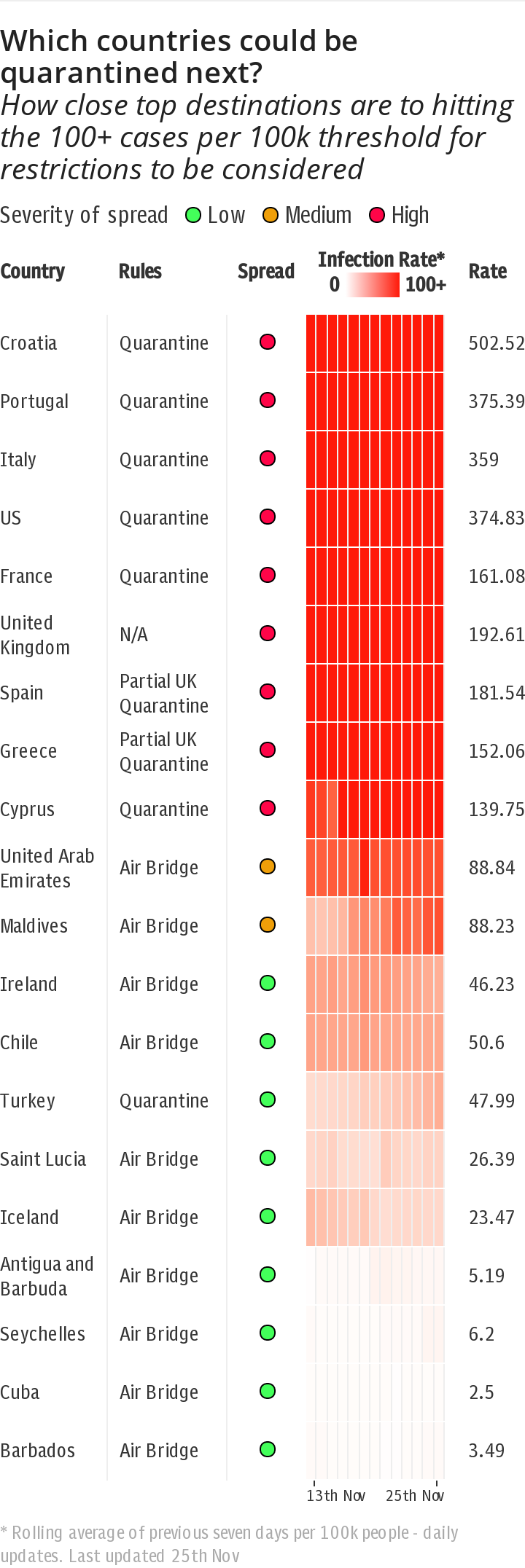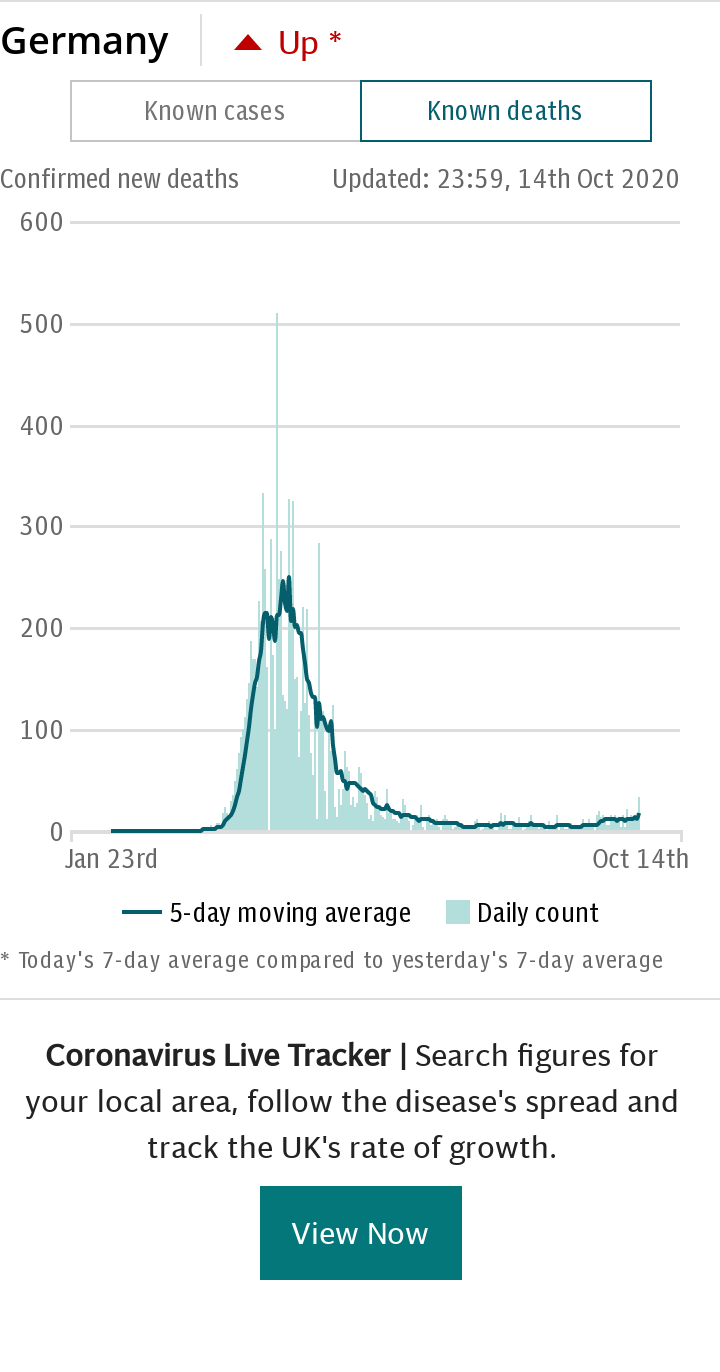'Utter devastation' for holidays as Canary Islands lose travel corridor
Watch: Canary Islands removed from travel corridors list
The Canary Islands have been removed from the UK’s travel corridors list, throwing Christmas holiday plans into disarray for thousands of Britons.
Grant Shapps Tweeted to announce that anyone arriving back from the Canary Islands after 4am on Saturday December 12 will need to self-isolate on their return.
The decision to remove the Canary Islands has sparked dismay among holidaymakers and the travel industry, as it was the most popular destination of the (then) 24 places that British people could feasibly travel to this winter, without restrictions.
While Covid-19 case numbers in Tenerife are high (96.1 cases per 100,000 over 7 days), the rest of the Canaries have relatively low case numbers (all below 50 per 100,000), prompting questions as to why the islands have been grouped together rather than assessed individually, as with the Greek islands.

Paul Charles, CEO of travel consultancy the PC Agency, said: "It’s utterly devastating news not only for consumers who booked Christmas breaks but also for travel firms who benefited from the sales uplift."
As it stands, the quarantine for holidaymakers arriving back into the UK from countries without a travel corridor is 14 days. However, after December 15, people will be able to take a test after their fifth day of quarantine as part of the new 'Test to Release' programme. If negative, they will no longer need to self-isolate.
This means that anybody arriving back from the Canary Islands at midday on December 12 can take a Covid-19 test to exit quarantine five days later, on December 17.
Botswana and Saudi Arabia have been added to the travel corridors list. However, British holidaymakers cannot visit either without transiting via a red-listed country (flights to Botswana go via South Africa or Ethiopia), meaning you will still need to go into quarantine on your return to the UK despite the travel corridor.
Scroll down for more of the latest news.
There is a lot to debate in the approach the government has taken to travel corridors, but one thing is certain - removing the Canary Islands this close to the winter sun season is going to send some holiday companies bankrupt.
— Rory Boland (@roryboland) December 10, 2020
The Canary Islands (Tenerife, Lanzarote etc) are being removed from the travel corridor list due to rising infection rates. It’s utterly devastating news not only for consumers who booked #Xmas breaks but also for travel firms who benefited from the sales uplift. @ThePCAgency
— Paul Charles (@PPaulCharles) December 10, 2020
Absolute nonsense. We are in Lanzarote now and 80% of the resort is closed. There is nobody here! Our flight out had 100 empty seats. @grantshapps pic.twitter.com/vGkPlmtHBb
— Ryan Sproat (@sproat_ryan) December 10, 2020
Absolutely ridiculous, another blow for the travel industry
— HIGH RIDINGS TRAVEL (@HIGHRIDINGS) December 10, 2020
Why not treat the islands separately like you did for Greece? 😤
— Sam 💍 (@sampixeldot) December 10, 2020
Data indicates weekly cases and positive tests are increasing in the CANARY ISLANDS and so we are REMOVING them from the #TravelCorridor list to reduce the risk of importing COVID-19. From 4am Sat 12 Dec, if you arrive from these islands you WILL need to self-isolate.
— Rt Hon Grant Shapps MP (@grantshapps) December 10, 2020
If British skiers aren’t allowed into the EU from January it will likely spell the end for many British travel firms. If this ban is gone before February, the impact could be lower, as many businesses have already factored in that most Alpine ski countries aren’t opening their resorts until later this year.
With months of devastating restrictions ahead, it’s very hard to watch the Scottish Government allocate sector-specific cash to their hard-pressed travel agents, while down here Westminster ploughs ahead with a Brexit which polls show the British public resoundingly don’t want. This is not sovereignty, it’s self-harm… on a national scale.
advent

Bolivia, Ecuador and Peru all have low infection rates and are ideal candidates to have their Covid-related advisory removed by the FCDO. Peru allows European flights from December 15 as the next stage of its carefully planned re-opening.
The lack of movement so far by the Foreign Office Travel Advice Unit is puzzling and frustrating. They need to remember that their role is to protect citizens abroad and resist pressure by Public Health England to keep unnecessary advisories in place which just devalues the reputation of FCDO guidance

Including Namibia and Rwanda on the travel corridors list is a good start, but there are still many African countries on the ‘don’t travel’ list which have much lower Covid-19 rates than the UK – and where the camps and hotels used by visitors have gone to considerable lengths to make themselves Covid-safe.
The latest data from the European Centre for Disease Prevention and Control notes that Kenya has case numbers of around at 20.14 cases of Covid-19 per 100,000 over the last 14 days. Crucially, Kenya is a key gateway to East Africa. Opening it up would allow the hub of Nairobi to function, effectively lifting our knee off the economic neck of East Africa.
Similarly, in South Africa case levels are 84.77 per 100,000 – and it too has implemented clear protocols including the need for travellers to be tested before arrival, and screening on arrival. High-quality testing labs are widespread, as are high-quality private clinics and hospitals. South Africa is the hub for travel throughout Southern Africa, and so opening up travel here can have a disproportionately large positive effect on the region.
Botswana also has very clear arrival protocols and here case levels are also relatively low, at 89.68 per 100,000.All of the case rates for these countries compare exceedingly well with the UK’s current rate of 317.26 cases of Covid-19 per 100,000.
While infection rates appear to be declining markedly in Greece, France and Spain, they are still relatively high so I’m not expecting major changes to the list of travel corridors today and it would be surprising if any country loses its corridor at the moment. It’s also clear that the situation in the US is getting worse, meaning there’s no chance of corridors opening up in the short-term between the UK and US.
We may get more information later today on the Test to Release scheme due to begin next Tuesday, with quarantine reducing to five days plus test from high-risk countries. The sector is eagerly awaiting details of how private tests can be booked, where they can be taken, and whether the system will be ready on schedule. I’m certainly aware that there have been teething troubles developing the criteria for the new system.
The business travel industry is waking up to another hammer blow to its survival with the understanding that movement into the EU will be banned under Covid-19 regulations post-Brexit. It is imperative that the UK Government works with the EU to ensure continued safe and unrestricted movement for business travellers.
We urge the government to adopt a rigorous on-departure testing regime to satisfy Covid-19 concerns and to allow workers from across all industries rather than just high-profile exemptions to travel and continue their vital contribution to UK plc.
pubs - the good pub guide

Just when we’ve had some good news from the vaccine rollout, this news about post-Brexit European travel restrictions could sound the death knell for the travel trade.
Covid has already decimated business and government has been woeful in its lack of support for the industry.
Unfortunately, it’s no surprise that this shambles of a government hasn’t addressed post-Brexit travel arrangements despite there being only days left for negotiations. The much vaunted “oven-ready deal” has proved to be anything but.

japan - getty

For my own reasons, I’d rather not have the Covid-19 vaccination until it has been proven that it not only prevents me from falling seriously ill to the virus (I’m a healthy 33-year-old; that risk is almost zero, and is my risk alone to take) but also prevents me from transmitting it to others. Until scientists can confirm that Covid-vaccinated individuals no longer pose a threat to the wider population, it is not selfish to refuse the jab.
The Government appreciates this, and has said that the vaccine will not be mandatory. Why then, is it looking increasingly likely that I’ll have to roll up my sleeve if I want to travel freely again in the future? More than half of Britons back a ban on air travel for those unwilling to have the shot, according to a recent YouGov poll. This is a troubling prospect indeed, and yet another affront on the basic rights we once took for granted – all for a virus with a survival rate of at least 99 per cent.
Very few countries we can travel to require us to present evidence of vaccinations before visiting, even for diseases like rabies, which has a 100 per cent mortality rate. Certainly, no airlines do.
Australia, where half my family is based, has already stated that it won’t reopen its borders to foreign visitors until the end of 2021, and only then when there’s an approved vaccine in circulation. Qantas, its national flag carrier, has gone further, its CEO Alan Joyce saying that “once a safe and effective vaccine becomes readily available, it will be a requirement for travel on our international services.”
On board the Boeing Stratocruiser - Getty

Drinks are served to 747 passengers in 1970 - Getty

On board a prototype Air France 747 - Getty

On the face of it, the situation is bad. From January 1, Britain will no longer be a de facto EU member state (as per the withdrawal agreement), and the bloc’s list of “safe” non-EU countries – to which it does not advise travel restrictions – contains just eight names. They include the likes of New Zealand and Australia, where Covid has been practically eliminated, and Japan, which has a seven-day infection rate of just 12.6 per 100,000 – rather lower than the UK’s 161.8.
It would take a Christmas miracle for Britain’s infection rate to fall sufficiently in the next three weeks for the country to find itself added to this exclusive lineup. Indeed, even with a vaccine being rolled out, it looks unlikely that cases will tumble to any significant degree until the spring, or perhaps later. But does that mean the EU will be off-limits until April or May?
Firstly, it should be noted that much of Europe is already off-limits. Britons cannot currently visit Finland or Denmark at all, while Norway, Estonia, Latvia, Lithuania, Iceland and Germany, to name a few, require UK arrivals to self-isolate for up to 14 days.
Furthermore, the UK’s own travel corridors list contains just a handful of European countries, so Brits returning from the likes of Spain, France, Italy and Portugal must self-isolate for 14 days (or, from December 15, around a week if they pay for a test). So this post-Brexit “ban” on UK travellers is unlikely to change much.
Since the pandemic hit, thousands of airport workers, airline staff, and cabin crew have lost their jobs, in surely the largest mass-redundancy drive the aviation industry has ever seen. But in seeking new work, many airline personnel have since proved themselves essential to the NHS – and the country – in the battle against Covid-19.
Redundant airport workers have taken on a variety of key roles: from contact tracing and Covid testers at airports, to emergency services telephone operators and care home workers.
Former cabin crew are thought to be particularly sought-after to fill the new positions as vaccinators, owing to their high-level first aid training and experience dealing with the general public, and could prove pivotal to the rollout.
london - getty

london - getty

london - getty

This information, if correct, is hardly helpful in terms of resuscitation of the beleaguered travel industry. Quite frankly, we despair… our 220 specialist holiday companies and travel agents would normally sell a considerable amount of holidays within Europe across the six months from April to October.
Having had no income now for over 12 months, the prospect of the booking famine continuing and customer confidence being hit yet again is, quite honestly, devastating, on top of the key issue of FCDO Advice needing urgent attention to regionalise Travel Advice in a sensible way.
We urge the Government to grit its teeth and agree a deal with the EU. Those who voted for Brexit definitely did not vote for an end to their beloved holidays in Europe.
Boris can get hold of free holidays in the Caribbean, but most of us can’t afford to travel long-haul or are too concerned about the carbon emissions to do so. If the travel industry cannot operate into Europe, flight routes won’t be in place to bring visitors to the UK; the UK economy will suffer twice over. There is simply no joined-up thinking by Government, and no consultation with the travel industry. Our Government unfortunately currently resembles Bedlam – literally, a mad house.
One can only wonder how Government Ministers will react when they go to book a relaxing holiday in July and August, over the long Parliamentary break. They are likely to find far fewer holiday companies still in business to organise their holiday for them, and far less choice than they have enjoyed to date.
Tui has identified the various challenges and changes related to different potential Brexit scenarios and remains in intensive dialogue with the respective authorities. The Group considers those challenges manageable and its Brexit preparedness task force is already implementing changes for certain scenarios.
In light of the current circumstances determined in particular by the pandemic, TUI has additionally initiated a global realignment programme which enables it to emerge from the crisis as a stronger and more efficient tourism group.

Despite the optimism of this week’s vaccine rollout, just three in ten Britons plan to travel internationally in 2021, according to a new YouGov poll. Health concerns and travel restrictions clearly continue to put a dampener on our collective wanderlust. And with the world unlikely to return to any pre-pandemic normality until at least 2022, the next 12 months could prove even more testing for a travel industry currently idling in neutral.
Developing economies, heavily dependent upon tourism, will decline further. Airlines and tour operators will likely fold. Tour guides, hoteliers and taxi drivers will lose their jobs. When we emerge the other side, museums, galleries and restaurants may have closed their doors for good. For many, the immediate future looks bleak.
When I see these findings, however, I see an unprecedented opportunity for the consumer. An opportunity for three in ten plucky travellers to visit attractions free from overcrowding, with shorter queues and readily available tickets that were once like gold dust.
venice - getty

This potential issue [of the EU's Covid regulations] is one of a number of reasons why airlines urgently need clarity on the status of post-Brexit air services. We urge the UK and EU to conclude the negotiations to allow for a seamless continuation of air services, either through a comprehensive agreement or a contingency plan specifically for aviation.
The EU has sought to adopt a common approach to travel restrictions, but this is only a recommendation and individual countries are able to implement their own measures, including options like travel corridors and testing.
It is too early to say what restrictions might be in place on January 1, given the uncertain nature of the pandemic, but we know that UK travellers are hugely important to a number of EU destinations, including some winter-sun favourites like the Canary Islands and Madeira.
London Southend Airport has invested heavily in safe travel, with new security equipment to minimize contact, hand sanitizer every 20 paces and social distancing measures in place. The key to opening up travel is now pre-departure testing which is rapid, reliable and reasonably priced and we call on Government to work with the industry to put that in place as a matter of urgency
There is no EU blanket law which requires individual states to limit entry from those arriving from outside the EU and so just as they do today, we expect individual European countries to continue to apply their own rules. Encouraging.
Given the stalemate of the current Brexit talks and the increased possibility of no-deal, the EU seems to be moving towards this travel ban almost as a retaliatory move, when other countries have higher rates of Covid infection while still them allowing entry into EU states. So it seems rather duplicitous to do this, but not surprising.
That aside, the introduction of the Pfizer/BioNTech vaccine this week and its progressive roll-out over the next few weeks across the United Kingdom will almost certainly have a positive effect in curtailing infection and death rates, thereby undermining the basis for the EU travel ban for UK citizens. In the interests of economic activity, it's likely this ban will not stay in place for long – and of course, the UK Government could reciprocate with selective bans for EU travellers too.
In some ways, that the UK was the first in the world to adopt the vaccine has definitely irked the Europeans – the cynic in me says this is all inextricably linked.Watch: Should I pay off debt or save money during the coronavirus pandemic?

